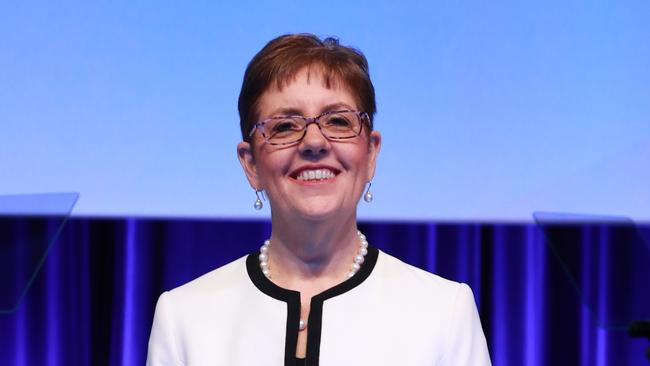AMP CEO Alexis George ‘disappointed’ over outcome of Mirvac vote on wholesale office fund
Chief executive Alexis George has expressed her disappointment after Mirvac won control of the wealth manager’s flagship wholesale office fund.

AMP chief executive Alexis George has expressed her disappointment after property giant Mirvac won control of the wealth manager’s flagship $7.7bn wholesale office fund.
“The result last night was extremely disappointing. The Wholesale Office Fund is one of the best performing funds over the last three years in that sector,” Ms George said on Tuesday.
“Together with Dexus we put a compelling offer on the table … but I respect the vote of the investors,” she said.
The property developer and funds manager won a resounding vote to take over the running of the AMP Capital Wholesale Office Fund after a long battle in which it garnered the support of key superannuation fund investors.
Mirvac won the backing of about 60 per cent of the vote, with about 29 per cent against it taking over the fund, as some investors abstained.
The move was a rare show of force by wholesale investors who requisitioned the meeting in May, a month after Dexus bought Collimate’s then $28bn local real estate and infrastructure funds management business for $250m.
“I don’t think anyone was naive about this outcome. We’ve been working really hard knowing it was going to be close. I don‘t think there’s skill shortages inside (the team), I’ve never heard of deficiencies in the team,” Ms George said.
“I’ve spoken to many investors in the past few months … at the end of the day they believe they want their assets with a different manager. While I’m incredibly disappointed, I have to respect the decision.”
The Australian first revealed that Mirvac would attempt to intervene in the management of the office trust in April, after it wrote to the trustee calling on it to engage with a proposal to run the fund, which owns stakes in key skyscrapers including Sydney’s Quay Quarter Tower. It also owns stakes in 33 Alfred Street in Sydney and major buildings in Melbourne.
The loss of the fund out of the Collimate stable upset plans to transfer management to Dexus. After the loss of the office trust and, separately, a $3bn mandate for UniSuper to GPT, the most that will shift across is $20.2bn.
Analysts at Macquarie said the outcome would have minimal impact for Dexus in the short term, but was strategically significant.
“We note the strategic significance of AWOF given potential for additional growth in office funds under management, particularly via Dexus’ development pipeline. Therefore, while the remainder of the platform should generate higher fees, the growth outlook may be more challenging,” the analysts told clients.
S&P Ratings, meanwhile, said the change of trustee should ease funding pressure on the fund.
“The decision by AWOF unitholders to replace the current trustee with Mirvac should provide the fund with an experienced property manager and the potential to participate in Mirvac’s office and mixed-use development pipeline,” the ratings agency said.
“Crucially, the provision of a proposed $500m liquidity facility by Mirvac should help to ease pressure on the fund’s liquidity and financial leverage. We note that this liquidity facility remains conditional on unitholder approval of changes to AWOF’s constitution.”
Speaking to Allan Gray’s Simon Mawhinney, Ms George also defended the culture in the wealth manager’s advice arm, saying accusations of misogyny do not reflect the business.
“Sometimes I get disappointed that those comments (on misogyny) still get made. I wasn’t here two or three years ago but if I look at the AMP of today … I don’t see that kind of feedback coming back,” she said.
“We still have to keep delivering on the promises we’re making to the network. And we haven’t always done that, let’s be honest. We’ve made grandiose plans and we haven’t always delivered.
“But I don’t think that’s been the case in the last 12 months. I do think we’ve put out plans, we’ve delivered to the plans and we’re continuing to deliver to the plans.”
The culture at AMP had changed “markedly” over the last few years, she added.
“The misogynistic thing goes right to my heart because clearly I’m a female, our chairman is a female, and now half of our executive team are female.
“So I think the culture has changed, is changing, and will continue to evolve. And we’ve been very strong about the commitment to advice. I don’t think that (misogyny) is the AMP of today.”
AMP shares were down 2.4 per cent to $1 in a lower market just after lunch on Tuesday.






To join the conversation, please log in. Don't have an account? Register
Join the conversation, you are commenting as Logout